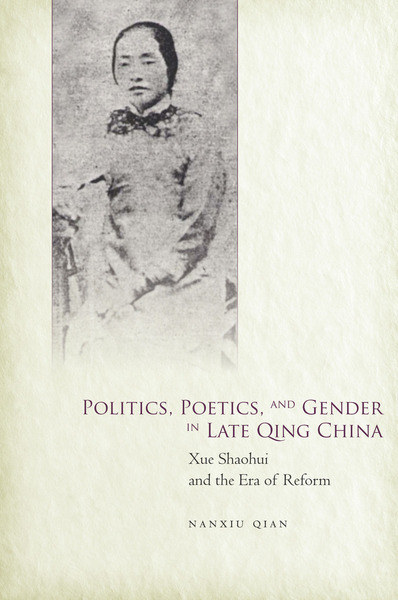
2015
392 pages.
$80.00
Hardcover ISBN: 9780804792400
Ebook ISBN: 9780804794275
In 1898, Qing dynasty emperor Guangxu ordered a series of reforms to correct the political, economic, cultural, and educational weaknesses exposed by China's defeat by Japan in the First Sino-Japanese War. The "Hundred Day's Reform" has received a great deal of attention from historians who have focused on the well-known male historical actors, but until now the Qing women reformers have received almost no consideration. In this book, historian Nanxiu Qian reveals the contributions of the active, optimistic, and self-sufficient women reformers of the late Qing Dynasty.
Qian examines the late Qing reforms from the perspective of Xue Shaohui, a leading woman writer who openly argued against male reformers' approach that subordinated women's issues to larger national concerns, instead prioritizing women's self-improvement over national empowerment. Drawing upon intellectual and spiritual resources from the freewheeling, xianyuan (worthy ladies) model of the Wei-Jin period of Chinese history (220–420) and the culture of women writers of late imperial China, and open to Western ideas and knowledge, Xue and the reform-minded members of her social and intellectual networks went beyond the inherited Confucian pattern in their quest for an ideal womanhood and an ideal social order. Demanding equal political and educational rights with men, women reformers challenged leading male reformers' purpose of achieving national "wealth and power," intending instead to unite women of all nations in an effort to create a just and harmonious new world.
About the author
Nanxiu Qian is Associate Professor of Chinese Literature at Rice University.
"Poetry and prose sensitively read, carefully annotated, and deftly translated provide a subjective perspective on such topics as the limitations of a masculine approach to cultural reform, China's accommodation of Western ideas and technologies, and the political imperatives of the era. This book is a must read for scholars in Chinese women's history, modern Chinese history, and Chinese literary history."
—Joan Judge, York University
"Although Xue Shaohui is not yet a household name, I suspect that she would become one with the publication of this book. Opinionated, learned, and indefatigable, the visionary pioneer in women's education and journalism should be celebrated as a role model today, yet she is virtually unknown in and out of China. In restoring Xue to her rightful place in history and in explaining the reasons for her obsolescence, Nanxiu Qian has proved herself to be as erudite, tough-minded, and poetic as the heroine of her book."
—Dorothy Ko, Columbia University
"The author succeeds in presenting the story of Xue in the intellectual context of the time and challenging the traditional nationalist discourse on women's emancipation....The book will contribute to the fields of late Qing history and Chinese women's studies by helping readers rethink the tension between Chinese nationalism and feminism."
—Guo Wu, The Historian
"Qian's study offers a sympathetic and nuanced portrayal of how an erudite woman brought up through a local yet cosmopolitan literary culture made the most of her learning, family connections, and capacity to adapt to the rapidly changing times in the late Qing....Joining other recent studies of classical poetry and literature in early twentiethcentury China, Nanxiu Qian's study has much to offer to students of late imperial and modern Chinese history, literature, and gender studies."
—Ke Ren, Frontiers of Literary Study in China